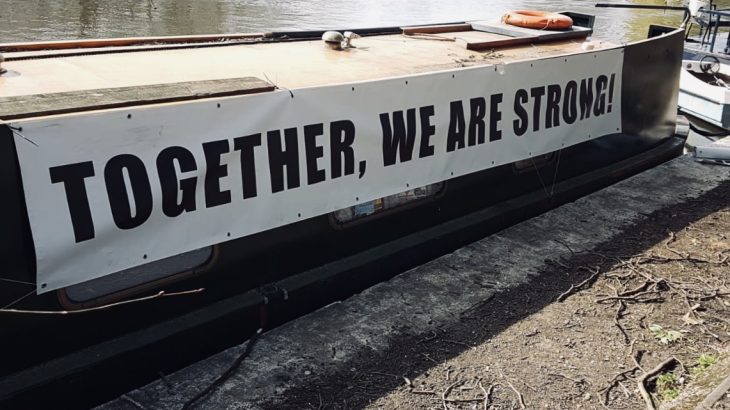The Canal and River Trust (CRT) is proposing that itinerant boaters should pay more for their licence than boaters with a mooring. Boaters, whether they have a home mooring or not, must not be divided by CRT’s latest attempt to target itinerant boaters and price our community off the water.
In a ‘consultation’ survey sent out to licence holders on 21st February, the CRT (the charity who manage Britain’s waterways) has revealed plans to charge boating customers above-inflation licence fee increases across the board, each year, for the next 10 years. Today, boaters pay an annual navigation licence fee – averaging £1000 – based solely on the length of their boat, with an added surcharge for widebeams and independent of any additional mooring fees. However, if CRT get their way, the future of our canals and rivers could see boaters being charged radically different fees dependent on how they use their boats.
The National Bargee Travellers Association (NBTA) vociferously oppose the call for differential and divisive charging outlined in CRT’s survey. We are calling for unity between all boaters, and believe that if we stand together, CRT will have to reconsider the wisdom in trying to split our community.
Firstly, the proposal to differentiate between boaters with and without a home mooring appears to have no legal basis. The British Waterways Act 1995 states clearly that there is one licence that can be held, either with – or without – a home mooring. Provisions in the British Waterways Acts 1971 and 1983 further underline the fact that a price differential of this nature would be unlawful and would leave CRT vulnerable to a legal challenge.
Secondly, differentiating between those with and without home moorings ignores the fact that a boat licence allows all boaters to enjoy the same access to the network, its navigation structures and facilities. Whether you navigate continuously, frequently or just occasionally, all boaters rely on the functioning of our canal system – a system designed to be used, rather than just preserved. Many boaters will go between having a home mooring and navigating continuously over their time on the water. We are all part of one community drawn to the water. We are neighbours who share information, tools, experiences and friendship as well as a sense of collective responsibility for the waterways themselves. If licences must rise above inflation, why the need to discriminate? There’s no logic in making up a budget shortfall from a minority of 4,000 boats navigating continuously when 30,000 with moorings equally need maintenance of the canal network. All of us need locks to open, taps to work or water levels to be maintained, independent of discretionary use, so we can all continue to enjoy our shared lives on the water.
Thirdly, and to this point, CRT’s closed question ‘consultation’ manipulates division and insidiously asks customers to endorse above inflation price increases each year for the next 10 years, despite no compelling arguments for why the Trust’s ‘budget shortfall’ should be handed off to boaters in the first place. No spending figures are mentioned, and the seemingly promised benefits are entirely open ended. We feel that this is tantamount to extortion – directing boaters against one another instead of letting them question whether licence fee increases are necessary or appropriate. We do not believe CRT’s current management of funds represents good value for money and suggest the Trust stop wasting money on exorbitant executive pay, rebranding their corporate identity, marketing logos, consultant surveys and other gimmicks and instead be more transparent in explaining their spending.
Finally, however, is the question of the future of our waterways. Boaters – whether liveaboard or leisure, itinerant or with a home mooring – are the lifeblood of the canal system. We are not just users of the waterways, but custodians of it. We are a fundamental part of what makes the canals safe, beautiful and vibrant, giving them new life since the end of their industrial story. We cannot allow the CRT to divide our community and begin a process of pricing us off the water. Boaters of all stripes need to stand together and make sure that our way of life, in all its wonderful diversity, is preserved and respected as a benefit to the waterways, rather than a strain on it. We are stakeholders, and any rise to licence fees ought to be conditional on results for all of us, as a community.
The boating community is not happy, and the NBTA expects a backlash from boaters across the network. CRT may not want to listen – but by answering their leading and biased ‘consultation’ with a unified voice against division, we will make them.
Find the NBTA’s suggested answers to help people orient themselves though CRT’s questionnaire here.
